1. What is your first memory of discovering fantasy or horror literature?
I don't have a specific "eureka!" moment—at least not one that I can remember. What I do know is that in the
vague collage of memories that the years between 1959 and 1963 have become in my ageing head, the elements that
registered most significantly with me from the stuff I was reading—comic books, the Tarzan novels, the
James Bond books—were always the fantastical and/or creepy ones. I do remember—from before
I could read, actually—a hideously striking moment from a fairy tale my mum read to me and my sister; a
princess's favourite horse was beheaded and the head was mounted over her chamber door and later in the story
the head began to speak to her. That quite freaked me out, as I recall.
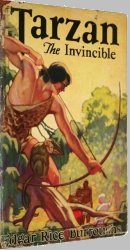
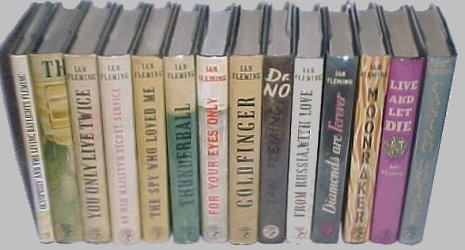 By the time I was eleven or twelve I was consciously seeking out the fantastic and the horrific—the Pan books
of horror stories, any Ray Bradbury collection I could get my hands on, paperback anthologies of older ghost stories,
the usual suspects for people of my generation—but it felt even then as if it was always what I'd been
interested in. I never felt a need to explain or defend it; it always seemed to me that that was what anybody in
their right mind would want to read. Forty years later, I still feel pretty much the same way; I mean, I'm extremely
catholic in my literary tastes and have always read very widely outside the genre but the truth is that there
isn't a single great canonical novel—from TOM JONES to THE GREAT GATSBY and all points in
between—that wouldn't, in my ridiculous opinion, be improved by the judicious inclusion of a ghost or a monster or two.
By the time I was eleven or twelve I was consciously seeking out the fantastic and the horrific—the Pan books
of horror stories, any Ray Bradbury collection I could get my hands on, paperback anthologies of older ghost stories,
the usual suspects for people of my generation—but it felt even then as if it was always what I'd been
interested in. I never felt a need to explain or defend it; it always seemed to me that that was what anybody in
their right mind would want to read. Forty years later, I still feel pretty much the same way; I mean, I'm extremely
catholic in my literary tastes and have always read very widely outside the genre but the truth is that there
isn't a single great canonical novel—from TOM JONES to THE GREAT GATSBY and all points in
between—that wouldn't, in my ridiculous opinion, be improved by the judicious inclusion of a ghost or a monster or two.
2. What made you want to become a writer?
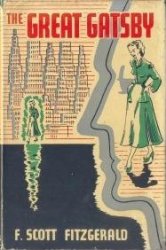 Again, it's hard to find a "Road to Damascus" moment. It never occurred to me that there was anything to do with one's life that didn't involve making shit up. I can't remember a time when I wasn't involved—however naively, however ineptly—in some form of creativity; music, theatre, film, literature, whatever. My focus eventually narrowed to prose fiction—because however bad I may be at it, I'm probably better at it than I am at anything else—but never to the complete exclusion of the other stuff; I still write and play music, I still work occasionally in the theatre, and I still of course write screenplays, which is where I actually make a living.
Again, it's hard to find a "Road to Damascus" moment. It never occurred to me that there was anything to do with one's life that didn't involve making shit up. I can't remember a time when I wasn't involved—however naively, however ineptly—in some form of creativity; music, theatre, film, literature, whatever. My focus eventually narrowed to prose fiction—because however bad I may be at it, I'm probably better at it than I am at anything else—but never to the complete exclusion of the other stuff; I still write and play music, I still work occasionally in the theatre, and I still of course write screenplays, which is where I actually make a living.
3. Who are your major influences and why?
You know, the older I get the more I realise that you don't always know who your influences are. You know who
your favourites are, but that's a different thing. It also seems asking for trouble—or at least invidious
comparison—to throw around the names of one's betters. But, for what it's worth, my holy trinity of artists are,
in order of their birth, Arthur Machen, Jean Cocteau, and Buster Keaton. They are the three to whose work I can go
back year after year, decade after decade, and still be delighted and transported. Machen, of course, is the
only one of the three whose fame rests almost entirely within our genre, but Cocteau and Keaton are fabulists
too and, anyone who doesn't see that, has a way too narrow definition of the fantastique for me. Other favourite
writers, inside and outside the genre, are Ray Bradbury, P.G. Wodehouse, Algernon Blackwood, Raymond Chandler,
Lord Dunsany, Eric Ambler . . . the list's just way too long—if I try to be more completist, I'll just
end up regretting the names I don't include.
4. When did you become interested in cinema?
At the risk of sounding like a broken record, I can't remember a time when I wasn't interested in it. I have my
mum to thank for it—she'd always loved the movies from when she herself was a little girl and she was taking me
and my sister to the pictures as soon as we could walk. That's true for many people, of course—I guess I knew my
interest was more than "normal" by the time I was eleven. I had two school friends whose last names were Cunningham
and Estorffe, and I remember how thrilled I was when I realised that our initials formed the acronym ACE. I
immediately "designed" a business card with the legend ACE FILMS and a big black ace of spades logo. I had a
silent 8mm camera—not even super-8, just standard—and we spent a few weekends making an animated epic
starring Action Man ("G.I. Joe" to our American readers). As my camera didn't actually have a stop-frame function,
you can imagine that the results weren't quite up to Harryhausen standards!
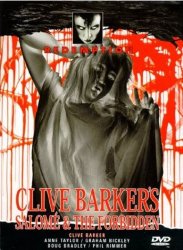 There was also a wonderful organisation in early 1970s Liverpool called the Merseyside Film Institute Society
that used to screen foreign and classic films several times a week at the Bluecoat Chambers. That was where I saw
my first Cocteau and Pasolini and Bunuel movies and really got an education in world cinema. By the mid-1970s, of
course, I'd joined the group that eventually became The Dog Company and we were making our
own "arthouse" movies like THE FORBIDDEN.
There was also a wonderful organisation in early 1970s Liverpool called the Merseyside Film Institute Society
that used to screen foreign and classic films several times a week at the Bluecoat Chambers. That was where I saw
my first Cocteau and Pasolini and Bunuel movies and really got an education in world cinema. By the mid-1970s, of
course, I'd joined the group that eventually became The Dog Company and we were making our
own "arthouse" movies like THE FORBIDDEN.
5. How did your first script come about?
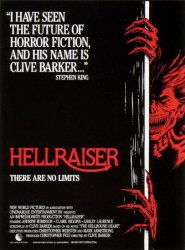 Clive Barker introduced me to Christopher Figg, a movie producer, with a recommendation that Chris hire me to write
the sequel to HELLRAISER. Chris and I had dinner and a nice chat and I got the job immediately. I'd never
written a script in my life. Not even sure I knew what one looked like.
Clive Barker introduced me to Christopher Figg, a movie producer, with a recommendation that Chris hire me to write
the sequel to HELLRAISER. Chris and I had dinner and a nice chat and I got the job immediately. I'd never
written a script in my life. Not even sure I knew what one looked like.
I tell the above story that baldly in order to acknowledge the huge amount of luck that went into my breaking into the film business. I apologise to everyone who worked for years on many screenplays before they even got a sniff.
The truth is, of course, that it wasn't only luck. Clive and I had worked together in live theatre for five years
and he'd read my fiction. He was well aware of my talent and abilities, and his recommendation wasn't based exclusively
on friendship. And Chris Figg isn't an idiot. Movie gigs are, in fact, very often won on verbal pitches lasting a lot
less time than a nice dinner and I am, false modesty aside, extremely "good in the room"—an industry expression
referring to the intangible combination of enthusiasm, confidence, and intelligence that leads otherwise sane and
miserly producers to throw money your way based on a pitch that, if written down and looked at in the cold light of
day, would be at best skeletal and at worst incomprehensible.
6. What are you most proud of amongst your own work and why?
Two or three of the short stories—"Aviatrix," "Doctor Arcadia," "The Cubist's Attorney"—still seem
pretty good to me, and my second novel—BIG THUNDER—holds up okay. From the
movies, HELLBOUND and WISHMASTER are still fun, I think. It's a tough question to answer, because
of my adorable shyness.
7. Do you find the process of writing—either fiction or screenplays—difficult?
No. I find starting the process extremely difficult. I'm very lazy and I'm a horrible procrastinator, and I only seem to get worse about that as I get older. Which is doubly stupid because, once I'm actually in the zone and the stuff is flowing, there is nothing that gives me greater pleasure.
8. If you were not a writer, what would you like to be?
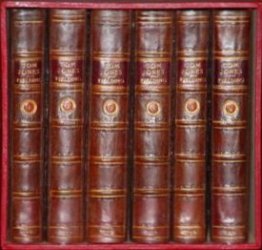 If I were not a writer, I'd like to be a writer. I know that sounds like a smart-arse answer but it's the truth. If I were forbidden by some kind of we've-got-guns-pointed-at-your-entire-family thing from writing, then I guess I'd like to make a living from some of the other stuff I do—composing, acting, publishing, editing. Which really suggests, doesn't it, that I'm a hopeless case and couldn't do anything resembling a real job. I wanted to be an astronaut when I was ten, if that helps.
If I were not a writer, I'd like to be a writer. I know that sounds like a smart-arse answer but it's the truth. If I were forbidden by some kind of we've-got-guns-pointed-at-your-entire-family thing from writing, then I guess I'd like to make a living from some of the other stuff I do—composing, acting, publishing, editing. Which really suggests, doesn't it, that I'm a hopeless case and couldn't do anything resembling a real job. I wanted to be an astronaut when I was ten, if that helps.
9. What advice would you give to a screenwriter just starting out?
I'd remind them tactfully and gently that, hard as it is to get published, it's even harder to get produced—so
they shouldn't write screenplays unless they feel there is a satisfaction in the form itself that will carry them
through the hard times and rejections and the statistical likelihood that nothing they write will ever make it to the
screen. And once I'd done my moral duty by attempting to dissuade them from a life of regret and disappointment, I'd
absolutely encourage them to go for it—because no regret or disappointment matches the regret and disappointment
of not trying. And if they wanted practical advice, I'd say ignore every stupid how-to book that's out there and
instead follow Pete's-Screenwriting-101: Imagine the movie's already been made; watch it in your head; write down
what you see and hear. That's it. It's not rocket science. But you have to love the movies—if you're doing
it because you think it's a quick way to make a lot of money, you're an idiot. (Though I'd have to add the rueful
caveat that there are a lot of rich idiots in Hollywood).
10. How do you feel about being Special Media Guest of Honour at the 2007 World Horror Convention in Toronto?
I'm far from sure that I deserve it, but I couldn't be more flattered or delighted. I'm very much looking forward to seeing everyone, old friends and new, at the Convention and will do my best as a GOH to help ensure it's a great experience for all who attend.

